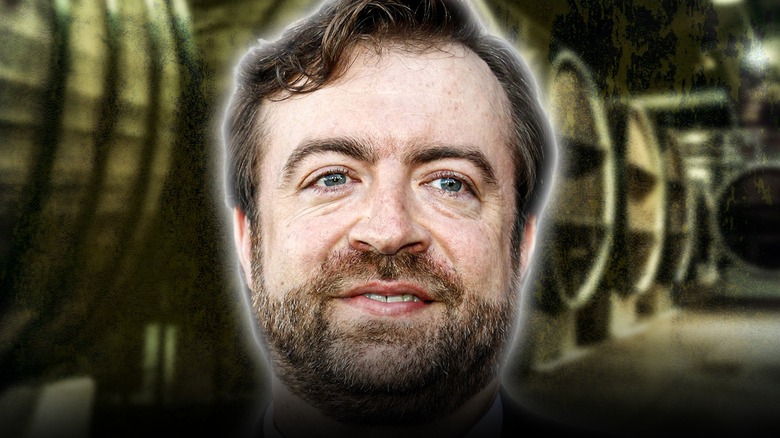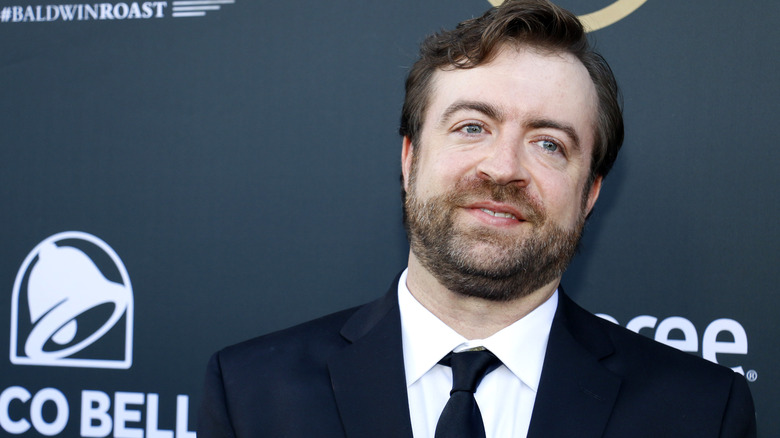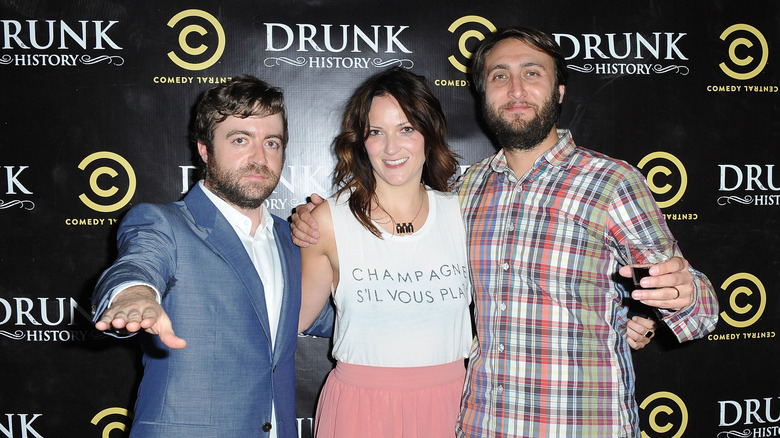The Hilarious Way Drunk History Got Its Start
Even folks who aren't fans of "Drunk History" probably at least know the premise: Get a comedian drunk, have them recite some historical tale, and then have sober stars enact that tale and lip-sync the comedian's lines. It's actually a pretty weird concept. And yet, the series took off in a big way on Comedy Central from 2013 to 2019, spanning 72 episodes and loads of memorable moments like Evan Rachel Wood's superb line delivery as Mary Shelly in Season 6, Episode 1, "Are You Afraid of the Drunk?"
In fact, the premise of "Drunk History" is weird enough to merit a whole bunch of questions: How did the show get pitched? How did it get approved? How did anyone think it would be a success? And most pertinently: How did it even start? Regarding that final question, the premise, format, etc., of "Drunk History" weren't planned or architected at all. Like many instances of creative inspiration, "Drunk History" arose in the moment. But from there — and like usual — a cool idea took some genuine labor to come to fruition.
In 2019, "Drunk History" co-creator Derek Waters — the guy who interviewed the show's narrators and co-drank with them — and the more behind the scenes co-creator Jeremy Konner, told Entertainment Weekly the tale of the origins of "Drunk History." As Waters said, he was listening to drunk friend Jake Johnson tell a story about musician Otis Redding. Waters took a step back and thought that the story was ridiculous and could never have happened. And then he thought, "Hey, what if people acted this story out?"
It all started with a drunken tale
In true "Drunk History" fashion, the tale of "Drunk History" began with a drunken tale about history. As Derek Waters told Entertainment Weekly in 2019, the first spark of inspiration for his future hit show dates back to 2007. Just to put things in proper perspective, that's when hit songs included "Don't Stop the Music" by Rihanna, George W. Bush was in his second term as president, and Myspace was the biggest social media platform. Even by then, Waters wasn't happy with how online comedy was all about "hits and not content," as he told No Film School. He wanted to make a proper show featuring comedy shorts, film it, edit it, screen it, and put it online.
Waters and his friend, actor Jake Johnson, were unemployed at the time. One night, Waters was listening to a trashed Johnson tell an obviously apocryphal story about soul legend Otis Redding, who died in a plane crash in Wisconsin in 1967. Johnson described a goodbye scene between Redding and his wife, Zelma Atwood, quoting each character using different voices. "Otis has gotta go," "No, Otis has got to go," Johnson quoted Redding saying (per Entertainment Weekly), to which Atwood replied things like, "I'll see you when you get back." At the same time, Johnson admitted he, of course, didn't know what Redding may have said to his wife and kept mumbling, "This never happened," Thus the light went on in Waters' head: What if this was the comedy show he wanted? What if he featured real historical tales? He partnered with his friend Jeremy Konner, who was working for Jack Black at the time, and the two set out to produce a video, mostly for fun.
The very first Michael Cera-led episode
At this point, folks should remember that "Drunk History" debuted as a little, independent web series on YouTube before Comedy Central picked it up for its 6-season run from 2013 to 2019. The show's initial seven episodes are still available in their original forms on YouTube on the channel DrunkHistory, and date back to the same year that Derek Waters had his epiphanous conversation with a drunk Jake Johnson in 2007.
The first episodes of "Drunk History" fell into place thanks to none other than comedian Michael Cera. Cera had just starred in both "Superbad" and "Juno" after finishing his run on "Arrested Development's" first three seasons and was on something of a comedic hot streak. And given the strange awkwardness of an actor lip-syncing someone else's drunken words while in period dress, few would argue that Cera was less than a perfect fit.
Waters and Konner reached out to connections like Cera to make a debut video. As he shared with No Film School, he told Cera about his idea for the initial episode, focusing on the well-known duel between Alexander Hamilton and Aaron Burr in 1804. Cera simply said, "Oh, well, if you'd shoot that, I would love to be in it." The episode went on to feature Cera, Waters, Johnson (drunk on a couch), and actress Ashley Johnson (no relation). The funny thing is, Waters didn't post it online right away. He only thought to do so later when "bored during the holidays," per No Film School. From there, there was no stopping the show.
The transition to Comedy Central
The transition from small, independent show to Comedy Central mainstay and the now-renowned legacy project took off in 2010 with comedian Will Ferrell, who starred in "Drunk History's" sixth episode as Abraham Lincoln aside Don Cheadle as Frederick Douglass. Until then, the show had already gained steam thanks to Jack Black playing Benjamin Franklin in "Drunk History's" original second and third episodes, titled, "Drunk History, vol. 2" and "Drunk History, vol. 2.5," respectively. But, it was the Ferrell episode that won the Sundance Film Festival's Jury Prize in Short Filmmaking in 2010. Like all "Drunk History" episodes, a huge chunk of its success centered on the narrator, which in this case was comedian Jen Kirkman, who narrated a total of four episodes pre- and post-Comedy Central.
"Drunk History's" success wasn't necessarily a guarantee at that point, however, as Waters told No Film School. Comedy Central expressed interest in picking up the show following the 2010 Sundance win, but Waters described himself as "hesitant" because he wasn't sure that the central premise of an actor acting out a comedian's drunken words could be more than just bit comedy, per No Film School. So, Waters wove travel into the mix, dropping into a variety of U.S. towns to learn local history and basing episodes on that. Voila: instant hit. And so it was that a simple drunken tale between two unemployed friends blossomed over six years from 2007 to "Drunk History's" Comedy Central-based, much less blurry version starting in 2013. Thanks for the assist, booze — you were great.


